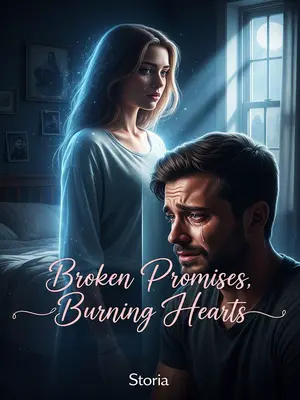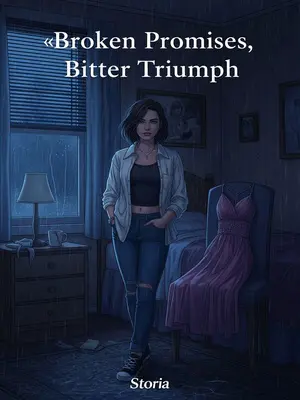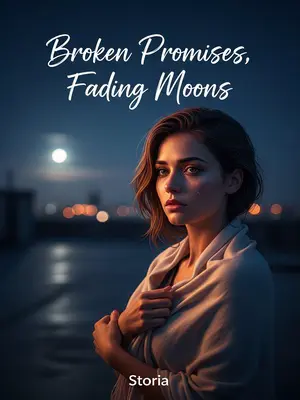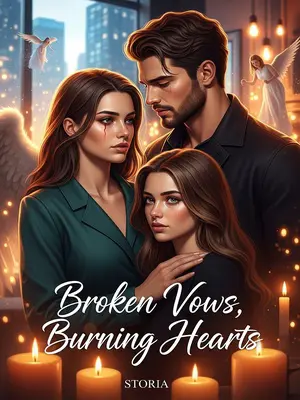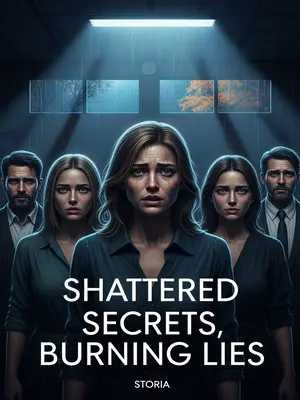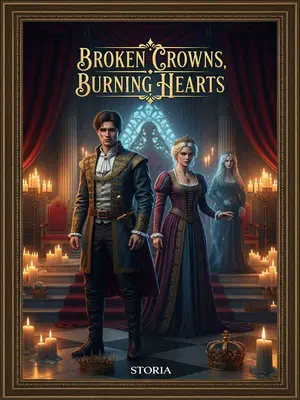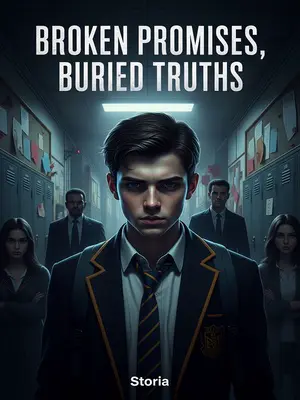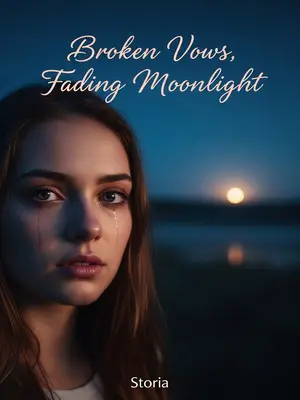Chapter 4: Basil Leaves and Goodbyes
I pictured her sitting on the edge of the bed, eating quietly, maybe watching TV with the volume turned low. For a moment, I felt a strange sense of comfort, like we were settling into a routine.
Not long after, I heard the door again. I started to worry. Could she have...
My stomach twisted. I rinsed off as fast as I could, heart pounding.
I immediately dried off, got dressed, and came out. The room was empty. I looked at the table—my wallet was gone.
Heart pounding, I ran out in my slippers. The hallway was empty.
My wallet had the $300 I'd just withdrawn, meant to buy her a phone.
That wasn't the important part. The important thing was that my ID, driver's license, student card, and insurance card were all inside.
I flopped onto the bed, thinking about what to do. To get a new ID, I'd have to go home. I had no idea how to replace my driver's license. I had an upcoming exam that needed my student card...
Damn it, I'm such an idiot!
I buried my face in my hands, replaying every decision that led me here. I could already hear my parents' voices: "We told you not to trust strangers."
I thought I'd met a scammed college girl, but it turned out she was a seasoned con artist running a long con.
And even worse, I found myself falling for a scammer pretending to be a scam victim. I lost, completely. I gambled and lost.
The door creaked open. Lauren stood there, holding dinner rolls.
She looked surprised to see me so rattled. The bag of rolls swung from her hand, and she blinked at me, unsure.
I was surprised, quickly hiding my disappointment.
I wanted to play the savior in front of her, so I had to stay calm and in control.
"Where did you go?"
Lauren jingled some coins in her hand. "After I bought the rolls, I realized the cashier forgot to give me change, so I went back down to get it."
She held out the change, as if to prove her honesty. I felt a wave of relief—and a little shame for doubting her.
I got up and saw my wallet sitting quietly under the table.
It was right there, untouched. I let out a breath I didn't know I was holding.
I hugged Lauren.
She stiffened up, like a popsicle, and asked, "What's wrong with you?"
Her voice was half-joking, half-worried. I let go, awkward.
I tried to play it off, "Nothing. I'm writing a novel, and got to the part where the guy hugs the girl. Just getting into character."
Her hand holding the rolls trembled. "Um, just asking—does your novel have anything more intense?"
She gave me a sly look, but her cheeks were pink. For a second, the tension broke, and we both laughed. Well, here goes nothing.
Me: "Now that you mention it, maybe I should add something."
Lauren sat on the edge of the bed, eating the rolls seriously. Suddenly, she asked, "Do you think I'm stupid?"
Her voice was small, almost childlike. She stared at the floor, her whole body tense.
Me: "Why do you say that?"
Her: "For getting tricked into a pyramid scheme."
I thought, "A little, to be honest."
But I didn't say it out loud. Instead, I tried to keep my tone gentle, waiting to see what she'd say next.
Her: "Guess what my degree is?"
Me: "Pre-K?"
She punched me. "Be serious! I graduated from college. Do you think you'd get tricked into a pyramid scheme?"
Me: "Of course not. If I joined, I'd bring the whole thing down from the inside."
I grinned, trying to lighten the mood. She rolled her eyes, but I saw a hint of a smile.
Lauren: "Let me tell you how I got tricked."
The two most important people in my life are my grandma and Jamie. My parents left when I was little; my grandma raised me.
Her voice softened when she talked about her grandma. There was a tenderness there that made me sit up and really listen.
I majored in nursing in college, and after graduation, I worked at a county hospital. Before my grandma was diagnosed with a blood clot, my nurse's salary was enough for us to get by. After she got sick, the doctor said the surgery would cost at least $6,000, and it needed to be done soon—the longer we waited, the riskier it got.
She paused, swallowing hard. I could see the worry etched into her face, the way her hands twisted in her lap.
At that point, I was already thinking about quitting. On a nurse's salary, it would take two years to save up enough for the surgery.
Jamie reached out—she probably saw my Instagram posts.
She was my middle school classmate, from a good family, smart.
Back in school, she'd sell apples on Christmas Eve, run errands for classmates for a fee.
In high school, Jamie started doing multi-level marketing. After she started making money, she often helped me out.
She was careful not to hurt my pride—she'd ask me to buy her lunch, buy two portions, and give me one, saying it was for my trouble.
So when she invited me to join her in the beauty business, I only asked her one thing: How long would it take to save $6,000?
Jamie told me, if business was good, three months.
With that answer, I quit my job immediately.
Lauren took a sip of water and continued.
Her hands shook a little, but her voice was steady. I could tell she'd told this story to herself a hundred times, trying to make sense of it.
When I first arrived, it really seemed like a beauty business. Jamie took me around to see shops and suppliers. Oddly, wherever we went, there was always a man following us.
Jamie said he was her cousin, wanted to join. Later I found out, he was the "manager" of the pyramid scheme.
A few days later, Jamie took me to a two-bedroom apartment in the suburbs, took my phone and ID for "project confidentiality."
Once inside, I realized I'd been tricked into a pyramid scheme.
The walls closed in fast. She described the feeling like being trapped underwater, everything muffled and slow. I felt my own chest tighten, just listening.
I wanted to resist, to break out. But that night, I gave up on the idea.
A young girl broke down that night, screaming to go home.
The manager rushed in, dragged her into another room, didn't even bother closing the door, stripped off her clothes, and raped her.
The words hung in the air, heavy and raw. I felt sick. "How did you finally get out?"
Lauren: "Whenever a new person joined, the team would take her out for brainwashing. I was there a while, so I counted as an old hand. During one of those trips, I escaped by climbing over a wall from the bathroom."
Her eyes were distant, like she was seeing it all again. I wanted to reach out, but I didn't know how.
"After escaping, I didn't know where to go, so I ran in the opposite direction from the hideout. With no money, I had to hitchhike on the interstate. I flagged down dozens of cars, terrified one of them would be from the gang and they'd drag me back. Finally, a middle-aged woman gave me a ride and dropped me off here."
Our campus is right by the highway—a lot of cars pass by.
I pictured her, thumb out on the shoulder of I-70, cars roaring past, hope flickering with every passing headlight. My heart squeezed tight.
I asked, "Why did you ask me for money for food?"
Lauren smiled. "I watched you at the 7-Eleven for a long time. I thought you seemed like a good person."
She said it so simply, like it was the most obvious thing in the world. I felt embarrassed, but also oddly proud.
Me: "What if I wasn't?"
Lauren: "Then I'd find someone else."
She shrugged, matter-of-fact. Honestly, I had to respect that.
Me: "So, for someone like me, how would a pyramid scheme target me?"
Lauren looked at me. "What do you want most?"
I glanced at my laptop. "I want to publish a book."
Lauren: "Okay, so if a really trusted friend told you he joined a publishing company, but they're missing a writer. He knows you, says your writing is great, they'll promote you, publish your book. Would you be tempted?"
I thought about it. "Yeah, I'd probably give it a try."
Lauren smiled. "Exactly. Once you go, you can't get out."
Her words made me shiver. It was too easy to imagine myself in her shoes, desperate for a break, willing to believe anything.
People always blame others for being foolish or careless when something bad happens. But in these carefully designed traps, it seems no one can escape.
In that moment, I realized Lauren was nothing like I'd imagined. Maybe, I really had fallen for her.
I couldn't laugh at her. Not anymore.
Later, she proved with her actions that she was clear-headed and rational, and the kindness and courage inside her shone so brightly that I couldn't even look straight at her.
It even made me start to doubt myself.
I started wondering if I was the naive one—if I could have survived what she did, or if I would've just given up.
"Did you contact your grandma after you escaped?"
Lauren: "No, she doesn't use these things."
She changed the subject. "Tomorrow I'll look for a job nearby. I might need to stay with you for a while, just to save up for travel."
I wanted to say, I'll give you the money—go see your grandma. But I swallowed the words.
I nodded. "Sure. If you don't mind the crowding, you can stay as long as you want."
I took a new phone out of the drawer. "The SIM card's already in there—go ahead and use it."
She took it, turning it over in her hands. For a second, I thought she might cry, but she just smiled and nodded.
We hadn't eaten dinner yet; my stomach was growling. I grabbed my wallet and said, "Let's go eat, and you can look for a job while we're out."
I had spicy mac and cheese; Lauren sat across from me and ate all the fried tofu out of my bowl. It was the first time she'd eaten from my bowl, and for some reason, that made me really happy.
I watched her, pretending to be annoyed, but secretly loving the way she picked out the tofu with her fork. Weird, right? But it did feel like the most intimate thing in the world.
On the way back, we saw a boutique hiring clerks—$400 a week.
The sign was taped crookedly to the window, bright orange marker on printer paper. Lauren's eyes lit up, and she hurried inside to ask about the job.
Lauren went in to ask, then came out smiling. "I start work tomorrow. I can earn my own money."
I patted her head. "Awesome!"
She ducked away, laughing. For the first time, she looked like any other college kid—hopeful, a little nervous, but excited for tomorrow.
That night, I lay awake for a long time.
The room was dark except for the streetlight leaking through the blinds. I could hear Lauren's breathing, steady and soft, and I wondered what she was dreaming about.
Lauren rolled over, crossed the dividing line, and put her hand on my chest.
Her touch was feather-light, tentative. My heart skipped a beat.
The streetlight outside shone on her face, and I suddenly thought she looked kind of pretty.
Her eyes were closed, lashes fanned out, mouth turned up in the faintest smile. I felt something shift inside me, something deep and a little scary.
I quietly scooted closer to the wall, wanting to put some distance between us.
I told myself it was the right thing to do. But I couldn't help wishing she'd reach for me again.
She suddenly moved all the way over to the wall, rested her head on my shoulder, and I could feel her breath on my chest.
I froze, afraid to move, afraid to break the spell. I could smell her shampoo, sweet and clean.
I whispered, "Are you asleep?"
Her: "Asleep."
Her answer made me smile. I held her and gently kissed her forehead. "I'm asleep too. In my dream, I'll kiss you."
I whispered it, half hoping she was awake to hear, half hoping she wasn't.
When I woke up the next day, she was already gone. Passing by the jewelry store, I saw her standing at the door, smiling at me.
She waved, holding a cup of coffee, hair pulled back in a neat ponytail. I felt a surge of pride, like I'd helped her find her feet again.
For the next month, we lived like a normal couple—doing our own things during the day, coming back to the apartment together at night.
We fell into an easy routine: breakfast at the corner café, separate days, shared dinners. Sometimes we'd watch old movies, sometimes we'd just talk until we fell asleep. It felt ordinary, but in the best way.
She said she liked working at the jewelry shop, and she sold a lot every day.
She'd come home with stories about customers—brides-to-be, nervous boyfriends, old ladies looking for something "special." Her eyes sparkled when she talked about it.
I went to her store once, pretending to buy a birthday present for a friend's girlfriend, and asked her to recommend a necklace.
She picked out a silver pendant with two leaves.
She said they were basil leaves, and the person who receives basil's blessing becomes the hero behind their lover.
I bought it and gave it to her.
She was happy for days, kept it in the box, reluctant to wear it.
She'd open the box sometimes, just to look at it, then close it again with a smile. I caught her once, tracing the outline of the leaves with her finger.
My novel draft also came along quickly—I was almost ready to send it to the editor.
The words flowed like they hadn't in months. I wrote late into the night, fueled by takeout and the sound of Lauren humming in the shower.
On payday, Lauren handed me $100. "Here, this is for you. Thanks for taking care of me."
She pressed the bill into my hand, her eyes serious. It felt strangely formal, like she was settling a debt.
Me: "You don't need to. I'll be taking care of you for a long time."
She stuffed the money into my hands. "No, you have to take it."
I joked, "But a hundred isn't enough—maybe a thousand would be about right."
She had to take the money back.
She laughed, but I saw the sadness in her eyes. She tucked the bill back into her purse, lips pressed tight.
I ruffled her hair. "Keep it for your grandma's treatment, or just buy yourself something."
She lowered her head and cried. "Grandma... I don't even know if she's still there."
Her shoulders shook, and I pulled her close, letting her cry into my shirt. I stroked her hair, whispering that everything would be okay, even if I couldn't quite believe it myself.
I hugged her. "Grandma must be waiting for you at home."
That night, we talked late into the night.
We lay side by side, staring at the ceiling, sharing stories about childhood, dreams, and the people we'd lost along the way. The darkness made it easier to be honest.
Before bed, I asked her, "Do you think we're right for each other?"
Her: "...I can't even think about that right now."
Her voice was soft, almost apologetic. I could hear the exhaustion in it.
Me: "But honestly, I can't stop thinking about you."
Her: "Then how do you get rid of it?"
Me: "Unless you reject me harshly."
She hugged me, lips close to my ear, and whispered, "Evan, remember—even if I die, I will never fall in love with you."
I remember it clearly. That night, she didn't hold me as we slept, and I fell asleep quickly.
The space between us felt wider than ever. I dreamed of her leaving, and woke up with the ache still in my chest.
When I woke up, Lauren was gone. The room was spotless and strangely empty.
Her scent lingered, faint and bittersweet. The bed was made, the floor swept, everything in its place. Gone. Just gone. It felt like she'd never been there at all.
She must have gone to the jewelry store.
I opened my laptop, kept writing, felt great, finished the draft by four, and sent it to the editor.
I stretched, whistled downstairs, ready to find Lauren for dinner.
Downstairs, Mr. Harris called out, "Hey, Evan, you and your girlfriend okay?"
He leaned on the counter, eyebrows raised. I waved him off. "No, we're fine."
Mr. Harris wanted to say more, but all I wanted was to eat with Lauren and share my good news.
I cut him off with a grin, already halfway out the door.
At the jewelry store, there was only one clerk—not Lauren.
I scanned the room, hoping she'd pop out from the back. The place felt colder, emptier.
I asked the boss, "Hey, where's Lauren?"
The boss hesitated. "You mean the tall, thin girl?"
I nodded. "Yeah."
Boss: "Wasn't her name Jamie? She already quit."
I nodded. "Oh, thanks."
I tried to keep my voice steady, but my stomach dropped. The world seemed to tilt a little. Wait—Jamie?
Strangely, I felt calm—just suddenly not hungry.
It was like all the air had been sucked out of the room. I walked back to the apartment in silence.
Downstairs, Mr. Harris stopped me. "I saw your girlfriend leave with her suitcase this morning. Are you sure you didn't argue?"
He looked genuinely concerned. I shook my head.
Was she my girlfriend?
The question echoed in my mind, louder than I expected. I realized I didn't know the answer.
Back in the room, I suddenly realized why the place felt so empty that morning.
Her clothes that used to hang on the wall were gone. The underwear she usually left by the window to dry was gone, the hangers neatly stacked aside.
But strangely, the whole room felt like nothing was missing—still just as crowded, just as stifling. The mess was all mine now.
I even wondered if Lauren had ever existed. Was her name Lauren, or Jamie?
What was that month together?
Was it just compensation for free food, drinks, and a place to stay?
Or were we ever really together?
Sometimes the world is strange like that. On this vast country, when one person leaves, the world mourns. But in this tiny apartment, one living person leaves, and everything stays the same.
The city outside kept moving—cars honking, people laughing on the sidewalk. But inside, time felt stuck.
I sat on the bed, moved the pillow, and found $100 underneath.
It was folded neatly, like a parting gift. I turned it over in my hands, searching for meaning.
I picked it up, leafing through it, looking for something.
I didn't even know what I was looking for—a letter, a note?
But there was nothing, just the money.
For the first time, I felt that pure money was worthless.
Just like that. Worthless.
It sat heavy in my palm, colder than I expected. I set it on the nightstand and lay back, staring at the ceiling.
A few days later, I got a reply from the editor: "Overall, very good, but the ending feels too rushed. Revise it."
I just stared at the screen. Me: "But a lot of endings really can't be changed."
The editor replied with an ellipsis, speechless, and never contacted me again.
His silence was louder than any rejection letter. I closed my laptop and didn't open it again for weeks.
After that, I never heard from Lauren again.
She never reached out, and I never tried to call her, even though the SIM card was from me.
I stared at my phone sometimes, thumb hovering over her number, but I never pressed "call." It was like we had an unspoken agreement to let it be.
Her leaving was as inexplicable as her arrival, catching me completely off guard.
I replayed our last night together, wondering if there was something I missed—a sign, a goodbye I didn't hear.
Much later, my Venmo account suddenly received a transfer of $900. I hadn't written anything in months, so it couldn't be a manuscript fee.
I looked closely at the profile picture—it was her and an old lady, taking a selfie.
They were both smiling, arms around each other, sunlight streaming through a window behind them. I stared at the photo for a long time. My heart thudded, something sharp and sweet in my chest.
Suddenly, I felt at peace. She and her grandma were okay.
Because I saw her wearing the basil leaf pendant I gave her.
She wore it proudly, front and center in the photo. It felt like a message just for me: I'm okay. Thank you.
What kind of person was she? Did she ever love me? Was everything she said true? Did she really exist?
None of that matters. What matters is, I really was someone's basil leaf.
Years later, I loved many people, got together, broke up. Thinking back to her, I finally understood why she left.
She was someone with clear goals:
She joined the pyramid scheme to earn $6,000 for her grandma's treatment;
She brought in new recruits to find a chance to escape;
She lived with me to save up for travel to see her grandma.
She left me $1,000—not for the money, but as a way to cut things off.
She tried to use money to sever feelings: You took my money, so living together was just sharing rent. Your love was just a transaction.
At that time, she was a lone traveler carrying responsibilities, her goal to save her grandma.
And I was just a drifting writer, my goal was to have a girlfriend.
She didn't have time for a young romance. I didn't have the ability to give her and her grandma a secure life.
I used to imagine, if I'd impulsively gone to look for her, would things have been different?
But now, I realize, everything was already decided.
Back then, I had no goals—just drifting along.
If my novel draft didn't get accepted, so be it;
If you didn't hug me in bed, I wouldn't hug you;
If you left and didn't contact me, I wouldn't contact you.
The right person, wrong time, wrong place, wrong ending.
I finally understand:
Love doesn't always happen just because two people like each other.
Sometimes, love is just being someone's basil leaf for a little while, and then letting go.
That's it. That's all there is.

